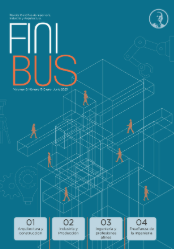Análisis comparativo de competencias emprendedoras según género en estudiantes universitarios de carreras de Ingeniería, Industria y Construcción
DOI:
https://doi.org/10.56124/finibus.v8i16.012Palabras clave:
competencias emprendedoras, análisis comparativo por género, estudiantes universitarios, carreras de ingeniería, industria y arquitecturaResumen
El estudio analiza diferencias por género en seis competencias emprendedoras clave en estudiantes universitarios de Ingeniería, Industria y Construcción. A partir de un enfoque cuantitativo, se aplicó un cuestionario basado en el instrumento desarrollado por la Universidad EAFIT (2017) a 383 estudiantes, y se utilizaron pruebas no paramétricas para comparar rangos promedio entre grupos. Los resultados indican que las mujeres presentan mayores niveles en apertura cognitiva, observación del entorno, generación de ideas y disposición al riesgo, mientras que los hombres destacan en adaptabilidad al cambio y experiencia de fracaso. Estos hallazgos reflejan perfiles diferenciados en la configuración emprendedora por género, lo que sugiere la necesidad de programas formativos diferenciados que fortalezcan competencias específicas en función de las características detectadas. La investigación contribuye al análisis técnico del emprendimiento universitario desde una perspectiva de género, con implicaciones prácticas para la mejora de la educación emprendedora.
Descargas
Citas
Alcalá, A., & Caballero, D. (2025). Licencia CC BY. Explorando la intención emprendedora y la creatividad. In www.revistainvecom.org (Vol. 5). www.revistainvecom.org.
Bae, Tae Jun, Qian, Shanshan, Miao, Chao, & Fiet, James O. (2014). The Relationship between Entrepreneurship Education and Entrepreneurial Intentions: A Meta–Analytic Review. Entrepreneurship Theory and Practice, 38(2), 217–254. https://doi.org/10.1111/etap.12095
Brush, C., Edelman, L. F., Manolova, T., & Welter, F. (2019). A gendered look at entrepreneurship ecosystems. Small Business Economics, 53(2), 393–408. https://doi.org/10.1007/s11187-018-9992-9
Collado-Dominguez, E. A. (2024). Emprendimiento y Responsabilidad Social en la Educación como Clave para Desarrollo Sostenible. Revista Docentes 2.0, 17(2), 390–403. https://doi.org/10.37843/rted.v17i2.585
Espinosa-Vélez, M. P., Mahauad, M. D., & Rojas, T. M. (2024). Analysis of the factors that influence the probability of entrepreneurship in Ecuador. European Public and Social Innovation Review, 9. https://doi.org/10.31637/epsir-2024-824
Gallegos, A., Rodríguez-Zavala, L., Martínez-Valera, P., Bouroncle-Velásquez, M. R., Vega-Mori, L., Teodori-de-la-Puente, R., & Valencia-Arias, A. (2025). Factors that determine female entrepreneurial intention: A systematic review of the literature. Intangible Capital, 21(1), 78–115. https://doi.org/10.3926/IC.2785
García, A. L., Corona, K., & Hernández, R. (2025). Análisis factorial exploratorio del instrumento para medir la efectividad del proceso educativo relacionado al emprendimiento en estudiantes de educación superior. Espacios, 46(02), 27–37. https://doi.org/10.48082/espacios-a25v46n02p03
Landa Agurto, C. (2024). Design of an academic management model for the training of entrepreneurs. Universidad Ciencia y Tecnología, 28(Special), 141–151. https://doi.org/10.47460/uct.v28ispecial.784
Man, T. W. Y., Lau, T., & Chan, K. F. (2002). The competitiveness of small and medium enterprises: A conceptualization with focus on entrepreneurial competencies. Journal of Business Venturing, 17(2), 123–142. https://doi.org/https://doi.org/10.1016/S0883-9026(00)00058-6
Martins, Pérez, Suárez, Álzate, & Rodríguez. (2018). Encuesta sobre la percepción, intención y actitud emprendedora de estudiantes universitarios.
Milanov, H., Prantl, K., Sheppard, S., & Ge, X. (2025). “I could, but why should I?”: Entrepreneurial women’s career pathways and how founding fits in (or doesn’t). Journal of Business Venturing Insights, 23. https://doi.org/10.1016/j.jbvi.2025.e00516
Noguera, M., Alvarez, C., & Urbano, D. (2013). Socio-cultural factors and female entrepreneurship. International Entrepreneurship and Management Journal, 9(2), 183–197. https://doi.org/10.1007/s11365-013-0251-x
Peña, T., Castellano, Y., & Welsy, D. (2016). Las Prácticas Profesionales como Potenciadoras del Perfil de Egreso. Caso: Escuela de Bibliotecología y Archivología de La Universidad del Zulia. Paradigma. XXXVII (1).
Rojas, M., & Chávez, K. (2024). Factores determinantes del éxito de los emprendimientos universitarios. REVISTA INVECOM. https://ve.scielo.org/scielo.php?script=sci_arttext&pid=S2739-00632024000200139
Wilson, Fiona, Kickul, Jill, & Marlino, Deborah. (2007). Gender, Entrepreneurial Self–Efficacy, and Entrepreneurial Career Intentions: Implications for Entrepreneurship Education1. Entrepreneurship Theory and Practice, 31(3), 387–406. https://doi.org/10.1111/j.1540-6520.2007.00179.x
Publicado
Cómo citar
Número
Sección
Licencia
Derechos de autor 2025 Revista Científica FINIBUS - Ingeniería, Industria y Arquitectura

Esta obra está bajo una licencia internacional Creative Commons Atribución-NoComercial-CompartirIgual 4.0.
















